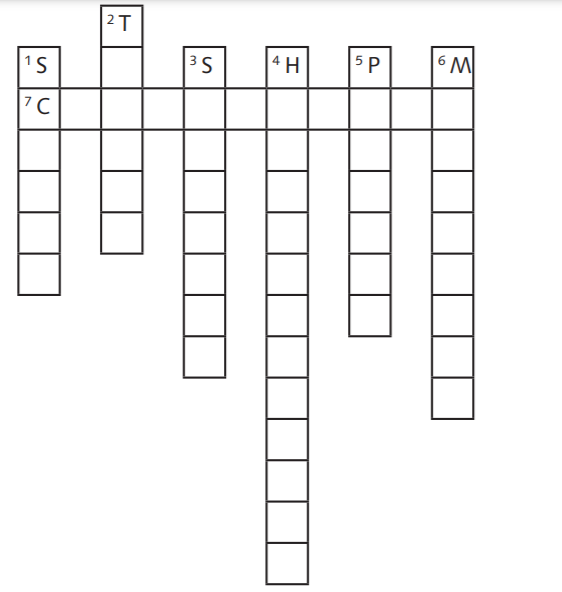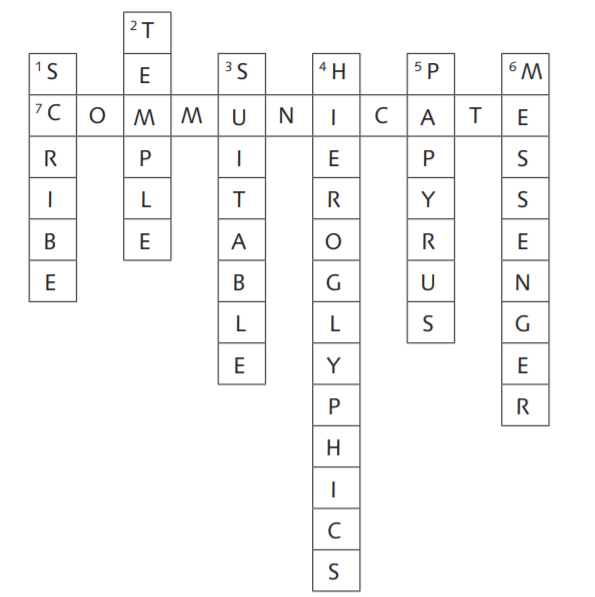Module 4
Lesson 3
SB page 39
First Conditional
1 Match the sentence beginnings (1–4) with their endings (a–d) then write them down in your notebook.
1. If you want to know more about communication by writing,
2. If you read this article, 3. If you are a caveman that is good at drawing,
4. If you want to send a letter,
a. you may decide to cover the walls of your cave with paintings of your hands.
b. you should use a postal service.
c. you should read this short history of writing.
d. you will want to know more about this subject.
1. c; 2. d; 3. a; 4. B
2 Read and complete the text about reading tracks in the desert. Then, listen and check your answers.
Audioscript
If you want to discover the desert and experience the life of the Bedouins who live there, you have to visit the Wadi Rum desert in Jordan. If you spend enough time there, you will soon be able to read and understand the surface of the sand like a book. If you see eaten grass and a disordered surface of the sand, you will know that a herd of sheep had passed from there. You will also notice the difference between a young traveller’s footprint and that of an older one. If you see wavy lines in the sand, you will know then that a snake was there not long ago.
Answers 1. want; 2. have to; 3. will; 4. see; 5. notice; 6. will know
3 Complete the statements and questions using the correct form of the verbs in brackets.
Example
What will you do if it rains tomorrow?
1. What (you / do) if it (rain) tomorrow?
2. If you (want) to learn Chinese, you (have) to study hard.
3. (you / help) me with my French homework if I (help) you with the dishes?
4. My sister (not go) to the theatre with us if she (not finish) her English homework.
5. Dad (tell) us where to find this information if we (phone) him.
6. If you (hurry) up, you (get) to the post office before they close.
Answers
2. If you want to learn Chinese, you will have to study hard.
3. Will you help me with my French homework if I help you with the dishes?
4. My sister won’t go to the theatre with us if she doesn’t finish her English homework.
5. Dad will tell us where to find this information if we phone him.
6. If you hurry up, you will get to the post office before they close.
4 Read the story below. Work in groups to make conditional sentences about the story.
Omar is a very hard-working student and he loves going to school. However, one of his classmates sitting next to him keeps bothering him and can’t let him focus in class. Omar’s grades begin to drop, and his parents are not happy with his performance anymore. One day, Omar decides to send an email to the headmaster explaining the situation so that his classmate stops bothering him. What do you think will happen if Omar sends the email? What if he doesn’t send it?
Example
A: If Omar sends the email, the headmaster will change Omar’s place in the classroom.
B: If Omar doesn’t send the email, his grades will keep on dropping.
Suggested answers
If Omar sends the email, his classmate won’t bother him again.
If Omar sends the email, his grades will become better.
If Omar sends the email, his parents will become happy with his performance again.
If Omar doesn’t send the email, his classmate will keep bothering him.
If Omar doesn’t send the email, his parents will keep being unhappy.
If Omar doesn’t send the email, he will not like going to school anymore.
5 Make a chain of five conditional sentences using one of the beginnings as your starting point.
Example
|
If I study hard, I will get into university. If I get into university, I will study hard. If I study hard, I will get a degree. If I get a degree, my parents will be very happy. If my parents are very happy, I will be happy too. |
1. If I study hard, …
2. If it doesn’t rain tomorrow, …
3. If I convince my parents, …
Answer Students’ own answers
6 Read the Speaking Strategies.
Speaking Strategies: Responding in discussions
● Listen carefully to each other when working in pairs to make the discussion more effective.
● A good way to show that you are listening carefully is to respond to what your partner is saying. This can be by asking a relevant question or saying something like, ‘Oh, really?’, ‘I agree’ or ‘Me too!’. You can also use facial expressions like gestures, eye contact and nodding.
7 Work in pairs. Ask and answer the questions about your day tomorrow, following the Speaking Strategies.
1. How will you feel if you have an exam?
2. What will you do if you have too much homework?
3. What will happen if you go to bed too late?
4. What will you do if you can’t get to sleep at night?
Answer Students’ own answers
8 In pairs, complete the table with conditional phrases
|
|
You |
Your partner |
|
I will play football this weekend if……. |
|
|
|
I will go to the public library tomorrow if …… |
|
|
|
If I listen to my parents …… |
|
|
Example
I will play football this weekend if I don't have any homework.
Answer Students’ own answers
9 In a group, have a debate about sending letters or emails, based on the statement 'It is a waste of paper and money to send someone a letter, not an email.' Use expressions like the ones on page 7, exercise 7, as well as other expressions like What if ...?; I'd agree with you if ...; If you are talking about ..., then ..., to agree or disagree.
Answer Students’ own answers
Activity Book 31 and 32
Second section
First Conditional
1 Complete the sentences with the correct form of the verbs from the box.
suffer walk write get book |
1. If you ………….. everywhere instead of taking the bus, you will be protecting the environment.
2. If you buy two books, you …………… another for free.
3. If you ………….. your flight early, you will often save money.
4. If you ……………… a letter to your friend, it will take time to get to him.
5. If I stay in the sun too long, I …………… from a terrible burn.
1. walk 2. will get 3. book 4. write 5. will suffer
2 Write five sentences using the First Conditional.
1. You / hear me better – turn / down / radio
You will hear me better if you turn down the radio.
2. We / not protect / environment –many species / die out
3. You / eat an apple every day –you / be very healthy
4. You / not pass your exam – you /not study
5. You / not become / astronaut – you / not study hard
6. Alice / get good grades – she / listen / the teacher
2. 2. If we do not protect the environment, many species will die out.
3. If you eat an apple every day, you will be very healthy.
4. You will not pass your exam if you do not study.
5. You will not become an astronaut if you do not study hard.
6. Alice will get good grades if she listens to the teacher.
3 Write sentences with sunny weather activities in one column and rainy weather activities in the other column. Use the suggestions in the box to help you. Begin your sentences:
If the weather is sunny / rainy tomorrow, I...
stay home and read a bookgo to the theatre play tenniswatch a documentary at homeplay computer gamesgo shopping with my friendsgo to the museumplay football with my friends |
Sunny weather activities |
Rainy weather activities |
1. If the weather’s sunny tomorrow, I’ll go to the theatre. |
1. If the weather’s rainy tomorrow, I’ll stay home and read a book. |
2. |
2. |
3. |
3. |
4. |
|
5. |
|
Sunny weather activities:
2. If the weather’s sunny tomorrow, I’ll play tennis.
3. If the weather’s sunny tomorrow, I’ll go shopping with my friends.
4. If the weather’s sunny tomorrow, I’ll go to the museum.
5. If the weather’s sunny tomorrow, I’ll play football with my friends.
Rainy weather activities:
2. If the weather’s rainy tomorrow, I’ll watch a documentary at home.
3. If the weather’s rainy tomorrow, I’ll play computer games.
4 Complete these questions and then answer them in your notebook so they are true for you.
1. What will you do (do) if it rains (rain) tomorrow?
If it rains tomorrow, I’ll read a book.
2. What civilisation …………. (write) about if the class ………… (do) a project on writing?
3. Who ………….. (choose) to work with on this project if you …………… (have to) work in pairs?
4. How ………….. (know) which computer to buy if you …………… (not ask) your friends?
5. What ……………. (do) if you……………. (want) to be a professional footballer?
6. What ……………… (get) if you …………… (switch) on the computer?
7. How much money …………. (spend) if you …………… (go) shopping with your friends?
2. What civilisation will you write about if the class does a project on writing?
3. Who will you choose to work with on this project if you have to work in pairs?
4. How will you know which computer to buy if you do not ask your friends?
5. What will you do if you want to be a professional footballer?
6. What will you get if you switch on the computer?
7. How much money will you spend if you go shopping with your friends?
Students’ own answers
5 Make a chain of three conditional sentences using each of the following beginnings.
1. If I get good grades in my exams, ...
2. If my family and I go on holiday to the sea, ...
3. If my friends in England can come to Jordan, ...
Example answers
- If I get good grades in my exams, my parents will be very proud.
- If my family and I go on holidays to the sea, we will have a lot of fun.
- If my friends in England can come to Jordan, I will take them on a tour and show them around.
6 Read the clues 1–6 and write the words in the puzzle. You are given the first letters.
1. a person in the past whose job was to copy out official documents
2. a place of worship in Ancient Egypt
3. appropriate for a particular person, purpose or situation
4. symbols that represent words, syllables or sounds and were used for writing in Ancient Egypt
5. a tall plant that grows in water and was used for writing on
6. a person who delivers messages as a job
7 What is the word for number 7? Write its clue.
Answers
1. SCRIBE
2. TEMPLE
3. SUITABLE
4. HIEROGLYPHICS
5. PAPYRUS
6. MESSENGER
7 What is the word for number 7? Write its clue.
7. COMMUNICATE: to share or exchange information

